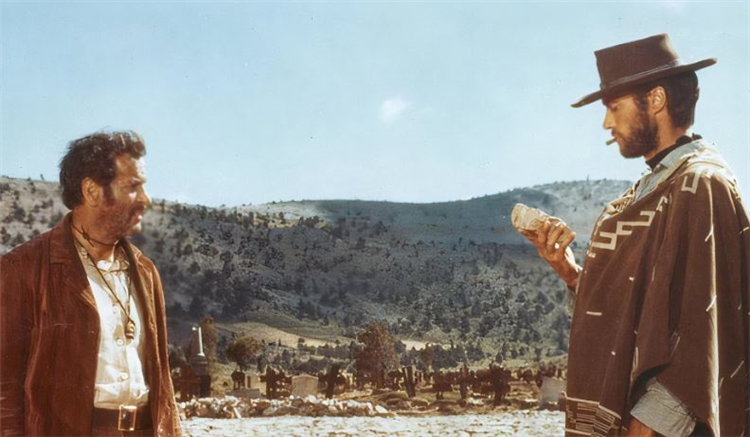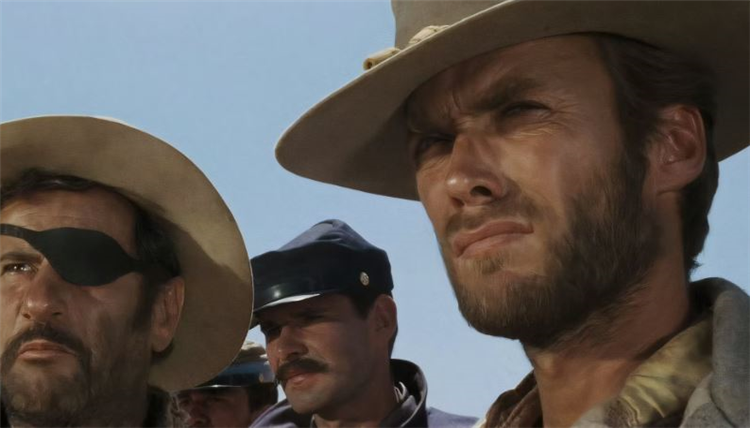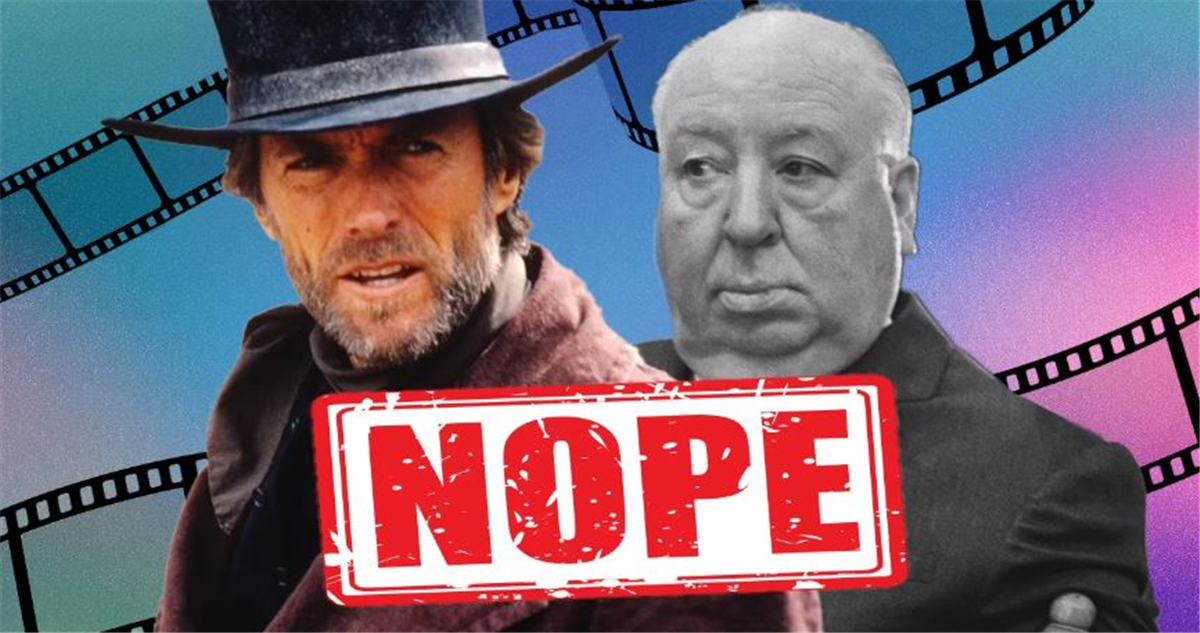“The Man with No Name” is one of Clint Eastwood’s career-defining roles. The drifter and bounty hunter appears throughout Sergio Leone’s Dollars Trilogy, taking the nicknames “Joe,” “Manco.” and “Blondie.” The character’s adventures collect cash rewards, retrieve gold buried in Sad Hill Cemetery, bring peace to the town of San Miguel, and help eliminate the notorious outlaw El Indio. The hero also exhibits all the characteristics of a perfect Western movie protagonist. He has a quick draw, he doesn’t talk much, he is independent, and is known for his moral ambiguity.
While “The Man with no Name” is great in A Fistful of Dollars and A Few Dollars More, he truly comes to life in The Good, the Bad & the Ugly, where he teams up with the bandit, Tuco (Eli Wallach), and navigates the chaos of the American Civil War to recover a cache of gold that is buried in an unmarked grave. The Western — featuring stunning Old West views and a toe-tapping songbook courtesy of Ennio Morricone — is considered one of the greatest of the greatest movies of all time, and is widely credited with catapulting Clint Eastwood and his fellow cast members into global stardom. Interestingly, Eastwood almost rejected the role.
Eastwood Was Worried About Getting Upstaged

Patrick McGillagan’s biographical book, Clint: the Life and Legend reveals that Clint Eastwood had two minds about the role. Even though he hadn’t yet matured into a bonafide A-lister, the actor still felt he was something special, and that he ought to be the standout man in every picture. When he saw the script, he became worried about getting upstaged, and he didn’t shy away from expressing these concerns to Sergio Leone.
“In the first film, I was alone. “In the second, we were two. Here we are three. If it goes on this way, in the next one I will be starring with the American cavalry.”
Eastwood indeed had every reason to be scared. Elli Wallach is sensational as the amiable but emotionally clotted outlaw, Tuco Ramirez, whose outrageous actions leaven the film’s weightier moments. Rarely has the actor’s weathered face and unyielding aura been used to better effect. To many fans, Tuco is arguably the best character in The Good, the Bad, and the Ugly. His and Blondie’s banter and relationship are the film’s lifeblood, yet the bandit contributes the biggest chunk of the film’s best quotes and is funnier than everyone else.
Additionally, Tuco is the most sophisticated person in the film — a greedy criminal who spends most of the film’s first half acting like a dimwitted toddler before mutating into a heroic orator. This kind of metamorphosis might have confounded many great actors, but Wallach manages it with astounding aplomb and intricacy. Much praise also goes to Lee Van Cleef for infusing the required malice in his role as the contract killer, Angel Eyes.
Another detailed biographical book, American Rebel: The Life of Clint Eastwood by Marc Elliot, discloses that Eastwood knew the studio would look to no other person to play a character he had made his own. He, therefore, played hard to get by demanding a non-negotiable salary of $250,000, and a Ferrari. That wasn’t it. He also demanded 10% of the profits for the film’s United States theatrical run.
So uncertain was Eastwood about the role that he fired his publicist, Ruth Marsh, who was urging him to accept the job, although the decision was partly influenced by the William Morris Agency’s dislike of Ruth. The agency backed Eastwood in whatever choices he made and felt that she was influencing him badly.
Eastwood Has a Long History of Saying No to Big Parts

The best part about being the best at your craft is that you can be very choosy. Throughout his career, Clint Eastwood has turned down many roles that ended up boosting the images of those who accepted the offer. Among the many iconic characters he opted not to play was James Bond. After Sean Connery’s retirement, Eastwood was among the top picks, but he felt the role needed to be reserved for a British actor. At that time, the producers didn’t see it that way, but thanks to this perspective, the tradition of casting an actor from the United Kingdom has been maintained ever since.
In the late ‘70s, Eastwood was called by Francis Ford Coppola and the president of Warner Bros. to offer him roles. The former wanted him to play Captain Benjamin L. Willard in Apocalypse Now, but Eastwood didn’t want to spend 16 weeks shooting in the jungles of the Philippines. The latter offered him the iconic role of Superman, but he declined too, fearing the role would result in him getting typecast. Additionally, he stated that he only wanted to play only roles grounded in reality.
Clint Eastwood’s hard-to-get streak would continue well into the ‘80s and ‘90s. He was considered for Rambo, Die Hard (claiming he didn’t get the humor), Blade Runner, and Men in Black, but opted to pursue ventures he was more enthusiastic about.
The Actor’s Choosy Nature Has Worked Out Just Fine for Him
Fans might feel a tinge of regret on behalf of Clint Eastwood for the great opportunities he missed, but his choosy nature has worked out just fine for him. There are plenty of actors who turned down roles and regretted it, but Eastwood can look back at his career with pride. He has won Oscars as both an actor and director and made a lot of money. In most cases, he didn’t turn down movies because he felt they were of low quality. He just didn’t see himself as the right fit, hence he figured he would neither enjoy the experience nor give his best.
The thought of Eastwood as Superman or James Bond sounds exciting, but most actors who have taken such kinds of roles have found it hard to shake them off. Sean Connery, Roger Moore, and Pierce Brosnan are mainly known as Bond, despite having done so much in their careers. Henry Cavill is finding it hard to wipe off the Superman tag too.
Saying no to The Good, the Bad and the Uglywould definitely have been a poor choice as there is either a chance that the movie might not have been made, or Eastwood would never have become as big an actor and director as he is now. But he still ought to be lauded for negotiating on his own terms. Self-confidence always pays.
